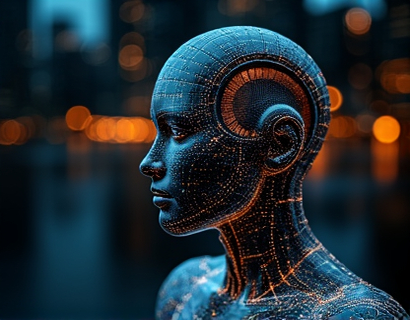AI and Crypto: Transforming Digital Experiences for the Next Generation
The integration of Artificial Intelligence (AI) and Cryptocurrency is revolutionizing the digital landscape, offering unprecedented opportunities for innovation and growth. This synergy is not just a trend but a fundamental shift in how we approach digital projects, enhancing insights, security, and user engagement. As we delve into this transformative power, it's essential to understand the core capabilities of both AI and cryptocurrency and how they can be merged to create smart solutions that redefine digital experiences.
Understanding AI and Its Role in Digital Transformation
Artificial Intelligence, encompassing machine learning, natural language processing, and predictive analytics, has become a cornerstone of modern technology. AI's ability to process vast amounts of data, identify patterns, and make decisions autonomously makes it an invaluable tool for businesses and developers. In the context of digital projects, AI can automate routine tasks, provide personalized user experiences, and offer predictive insights that drive strategic decision-making.
One of the most significant advantages of AI is its capacity for continuous learning and improvement. As AI systems interact with users and data, they refine their algorithms, becoming more accurate and efficient over time. This adaptability is crucial in a rapidly evolving digital environment where user expectations are constantly rising. By leveraging AI, digital projects can stay ahead of the curve, offering seamless and intuitive experiences that keep users engaged and satisfied.
Exploring the World of Cryptocurrency
Cryptocurrency, on the other hand, represents a paradigm shift in how we think about value, transactions, and security. Built on blockchain technology, cryptocurrencies like Bitcoin, Ethereum, and countless others provide a decentralized, transparent, and secure means of exchange. The underlying blockchain technology ensures that transactions are immutable and tamper-proof, eliminating the need for intermediaries and reducing transaction costs.
Beyond its role as a digital currency, cryptocurrency has opened up new possibilities in the realms of smart contracts, decentralized finance (DeFi), and non-fungible tokens (NFTs). These innovations leverage the inherent properties of blockchain to create new economic models and digital assets that were previously unimaginable. The intersection of cryptocurrency and AI further amplifies these possibilities, creating a powerful combination that can transform various industries.
Merging AI and Cryptocurrency: A Synergistic Approach
The true potential of AI and cryptocurrency is realized when they are combined to create smart, secure, and intelligent digital solutions. This fusion enables the development of applications that not only enhance user experiences but also ensure robust security and transparency. Here are some key areas where the integration of AI and cryptocurrency can drive significant advancements:
- Enhanced Security: AI can be used to detect and prevent fraudulent activities in cryptocurrency transactions. Machine learning algorithms analyze patterns and anomalies in real-time, identifying potential threats before they materialize. This proactive approach to security is crucial in a space where trust and reliability are paramount.
- Smart Contracts with AI: Smart contracts, self-executing contracts with the terms directly written into code, can be augmented with AI to create more dynamic and intelligent agreements. AI can help in automating complex conditions, predicting outcomes, and ensuring that all parties adhere to the contract terms, reducing the risk of disputes and errors.
- Personalized User Experiences: By combining AI's data analysis capabilities with the decentralized nature of cryptocurrency, digital platforms can offer highly personalized services. AI can analyze user behavior and preferences, while cryptocurrency can facilitate seamless transactions and reward systems, creating a closed-loop ecosystem that benefits both users and providers.
- Decentralized Data Markets: AI and cryptocurrency can revolutionize data trading by creating decentralized markets where users can sell and buy data securely and transparently. AI algorithms can help in data curation, ensuring that only high-quality, relevant data is traded, while blockchain ensures that data ownership and usage rights are clearly defined and enforced.
Strategies for Innovators: Leveraging AI and Cryptocurrency
For developers, entrepreneurs, and tech enthusiasts looking to harness the power of AI and cryptocurrency, here are some strategic approaches to consider:
First, embrace a user-centric design philosophy. Understanding the needs and behaviors of your target audience is crucial. AI can provide deep insights into user preferences and trends, allowing you to design experiences that resonate on a personal level. This not only enhances user engagement but also builds a loyal community around your project.
Second, focus on security and transparency. In the realm of cryptocurrency, trust is everything. Implementing AI-driven security measures can significantly enhance the confidence of users and investors. Additionally, using blockchain to create transparent and tamper-proof systems ensures that all transactions and interactions are verifiable and secure.
Third, explore decentralized solutions. Decentralized applications (dApps) powered by smart contracts and AI can offer unique value propositions that centralized systems cannot match. By leveraging the decentralized nature of cryptocurrency, you can create platforms that are resilient to censorship, downtime, and single points of failure.
Fourth, innovate with tokenomics. Tokenization can add a new dimension to your digital project, whether it's through incentivizing user participation, creating a native currency for transactions, or representing ownership in a decentralized governance model. AI can help in designing token economies that are balanced, fair, and aligned with the project's goals.
Finally, stay informed and adaptable. The fields of AI and cryptocurrency are rapidly evolving, with new breakthroughs and regulations emerging regularly. Stay updated with the latest developments, and be prepared to adapt your strategies accordingly. Collaboration with experts in both domains can also provide valuable insights and help navigate the complexities of this intersection.
Case Studies: Real-World Applications
To better understand the practical applications of AI and cryptocurrency, let's look at a few real-world examples:
One notable example is the use of AI in cryptocurrency trading platforms. These platforms employ machine learning algorithms to analyze market data, identify trends, and make informed trading decisions. By automating the trading process, these platforms can capitalize on opportunities more efficiently than human traders, while AI-driven risk management systems help mitigate potential losses.
Another example is the deployment of AI in decentralized identity verification systems. In this context, AI algorithms can verify user identities using blockchain-based credentials, ensuring that only authorized individuals access certain services. This not only enhances security but also provides users with greater control over their personal information.
A third example is the creation of AI-powered NFT marketplaces. These platforms use AI to curate and recommend unique digital assets based on user preferences and market trends. By integrating cryptocurrency, these marketplaces offer a seamless and secure way to buy, sell, and own digital art and collectibles, opening up new revenue streams for creators and collectors alike.
Future Outlook: The Next Generation of Digital Experiences
As AI and cryptocurrency continue to evolve, the possibilities for innovation are endless. The next generation of digital experiences will be characterized by unparalleled personalization, security, and engagement. Here are some forward-looking trends to watch:
First, the rise of AI-driven virtual assistants integrated with cryptocurrency wallets will redefine how users manage their digital assets. These assistants can handle transactions, monitor portfolios, and provide real-time insights, all while ensuring that all interactions are secure and private.
Second, the growth of decentralized autonomous organizations (DAOs) powered by AI and cryptocurrency will transform governance and decision-making processes. DAOs can leverage AI to analyze data, predict outcomes, and execute decisions autonomously, creating more efficient and transparent organizations.
Third, the integration of AI in metaverse and virtual reality (VR) platforms will create immersive experiences that are both secure and personalized. AI can enhance the realism and interactivity of virtual environments, while cryptocurrency can facilitate transactions and ownership within these spaces, opening up new economic opportunities.
In conclusion, the convergence of AI and cryptocurrency is not just a technological advancement but a transformative force that is reshaping the digital landscape. By embracing these technologies, innovators and enthusiasts can unlock new levels of insight, security, and engagement, paving the way for a future where digital experiences are smarter, safer, and more rewarding than ever before.











































